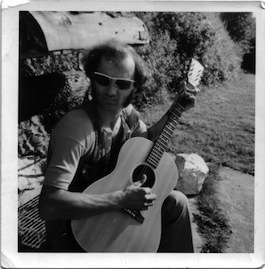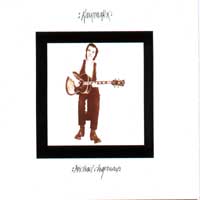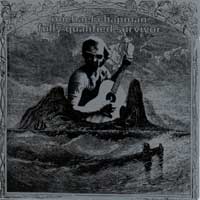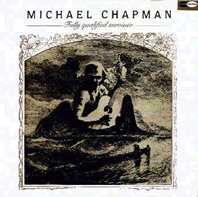 Michael Chapman, apart from being a prolific English songwriter whose revered work spans four decades, is probably the best guitar smith you have never heard. While his skills are best evidenced on this album’s predecessor, Rainmaker, the original songwriting and tight production, seemingly informed by all music that came before it, steal the show here. Michael Chapman, apart from being a prolific English songwriter whose revered work spans four decades, is probably the best guitar smith you have never heard. While his skills are best evidenced on this album’s predecessor, Rainmaker, the original songwriting and tight production, seemingly informed by all music that came before it, steal the show here.
It’s as if every style of rock music were somehow harnessed and tamed into Michael’s unique folk vision. The album sounds fresh as anything recorded today, yet still of its time, sparkling with punchy drum fills and orchestral arrangements. The album opens with an understated triumph: experimental strings create a soundscape for the soothing rhythm of “Aviator” to “take my time away.” I cannot think of another 9 minute song that doesn’t seem to last long enough. The lyrics on the album evoke a feeling of hopelessness, and there is a kind of sad tone but all together I believe it can be an uplifting album. This may be thanks to sharing much of the same personnel responsible for early albums by Elton John and David Bowie. During Fully Qualified’s hardest moments, though, I hear a striking resemblance to Bowie’s classic Man Who Sold The World . .
“Stranger In The Room” and “Soulful Lady” lend a classic rock balance to softer songs like the immortal “Postcards From Scarborough“, by far the most famous Chapman song. Through several interludes, we are treated to Chapman’s masterful six-string suites. I know my fair share of fingerpicking but still have trouble believing that “Naked Ladies & Electric Ragtime” is actually performed on one guitar by one person. In any case, it’s a piece that should be standard fare in guitar workshops the world over. But note that I’m not talking about the electric guitar leads, performed by Mick Ronson who would later team up with Bowie, for Space Oddity, thanks to this record.
In short, Fully Qualified Survivor is an exceptional collection of songs and your best introduction to one of England’s great underappreciated artists. words/ j. nardelli - aquarium drunkard blog 02 2011
Michael Chapman Fully Qualified Survivor
Most music fans carry around a mental short list of musicians who, in their minds, are woefully underappreciated not only by the general public but by other music fans. No matter what the genre--folk, metal, hip-hop, or whatever the latest permutation of electronic dance music is called--we can all think of a performer who in our estimation deserves wider name recognition and popularity. I'm no different, and there are plenty of people I can think of who deserve greater cultural regard (some names that spring to mind while I'm sitting here: Tony Hazzard, Tom Rapp, John Kongos, Roy Harper, Tim Hollier....). But today I'd like to single out one particular gentleman from my mental list and tell you why you should care about him.
That man's name is Michael Chapman.
Born and raised in Hunslet, a heavily industrial inner-city section of Leeds in the north of England, Michael Chapman started his professional life as an art teacher. He moonlighted as a guitarist, though, and it was a great time to be one in England, as people like Davy Graham and Bert Jansch were redefining the sound of acoustic folk music with their intricate fingerstyle playing. Chapman began to play the folk circuits in Cornwall and London in the late 60s. Perhaps it was his early environs, but Chapman seemed to have a natural facility for the blues, and his early sets leaned heavily on tunes like "See See Rider" and "Key to the Highway."
It wasn't long before Chapman was writing his own songs, though, and what songs they were. He seemed to have a world of living behind even his earliest efforts; it's a cliché to talk about how young singers sound like old singers, but Chapman's vocals had a grizzled, weary tone to them that perfectly suited his subject matter, which was reflective without being naval-gazing, and often dealt with the persistence of unhappy memories. His songs tended to focus on the aftermath of relationships gone sour, carefully sifting through regrets and recriminations to get to the truth behind the ways people construct and deconstruct their lives together.
One of these songs, the bar-setting "It Didn't Work Out," led off his first album, Rainmaker, released by Harvest in 1969. Rainmaker created the template for the rest of the albums that Chapman recorded for Harvest: mournful, lyrically acute songs mixed in with accomplished guitar instrumentals. The guitar instrumentals weren't filler, either; by this time, Chapman's fluid fingerstyle playing was just as accomplished as the playing of some of his better-known peers.
"Kodak Ghosts," the song featured in this post, originally appeared on Chapman's second album, Fully Qualified Survivor, from 1970. It's quintessential Chapman, and in this stripped-down version from his guest appearance on Hatch's show in 2005, you can hear how his skillful guitar playing propels the song's narrative about a guy sitting around after a failed relationship with only his dog for company (the dog is a nice Chapmanesque touch). He seems to be trying to convince himself that any effect the relationship had on him is over, even as he obsesses about his lover’s future partners and revisits old love haunts. The Kodak ghosts of the title are never mentioned, but you can imagine the old photos strewn on the guy's kitchen table, representations of a dead affair that continues to haunt his mind.
Before the song proper starts, check out that intro: Chapman jokes in his usual sardonic manner (live, he’s a very funny storyteller), and then he tosses off a few dazzling runs ornamented with harmonics that any other guitarist would kill for. For Chapman, it’s business as usual.
Chapman recorded four albums for Harvest, each one a gem and each one distinct from the other in its musical choices. In the mid-70s, he signed to Decca Records and moved in a rockier direction. Millstone Grit, the first of his Decca albums, signaled in its very title the way Chapman would go for much of the rest of the decade: tougher, harder, and louder. His electric period failed to set the world alight, however, and as the 80s and 90s went on, Chapman returned to a more folk and blues-based sound. He’s continued to make records at the rate of one every couple of years, and all of them have their merits; much like his contemporary Bert Jansch, who has continued to make good records while the world looks elsewhere, Michael Chapman has continued to be active artistically. His most recent release is called Time Past and Time Passing, released last year on Electric Ragtime Records
2009 Free Music Archive freemusicarchive.org
Michael Chapman, according to his bio, rose out of the Cornish folk circuit, which must have been a strange fit. His music surely has a melancholy feel that runs through plenty of traditional Cornish folk songs, but his biting edge and complex compositions must have surely made him an outlier. In fact, Chapman has been an outlier for much of his career, never quite garnering the praise he so deserved. But now, we’ve got a reissue of Fully Qualified Survivor, his sophomore album from 1970. It’s been out of print on vinyl for years. It’s never been issued on CD before. ( website ammendment first time on CD in USA, in europe/UK it has been reissued 3 times on CD and at least twice on vinyl )Oh, and it’s one of the best psych-folk records recorded. Ever.
Chapman’s first four albums came out on Harvest Records, an EMI-run British label that served as a hot bed for the psych-folk scene. It was home to, among others, Pink Floyd, Syd Barrett’s solo work, and fellow prog-folk singer Roy Harper—whose own 1971 album for Harvest, Stormcock, is a masterpiece. If you’re looking for a comparison to Chapman’s sound, Harper is as close as you’ll get, at least in some ways. The first track on Full Qualified Survivor, “Aviator”, does little to break that comparison. It’s a nearly ten-minute epic, as moody and wandering as anything on Stormcock, though if you’re looking for an album of huge suites, it’s a bit of a red herring.
After that huge, excellent, opening, Chapman continues to develop his own deep, vibrant sound. “Aviator” sets it all up for you; once you set aside the heft, you’ll hear how it falls right in line with the other, tighter songs that follow. We get Chapman’s smoky rasp of a voice, his subtly intricate guitar playing, and his eye for a sharp line, a sinister bark, and a striking detail. It’s a stunning piece about isolation and paranoia—everyone seems to be coming from all angles to “take [his] time away”, and you can feel the world closing in on him, not only in his weary voice but in the silence on the other end of a ringing phone or the stones thudding on the roof.
The solitary feel Chapman establishes is nothing self-pitying or fey. There’s bite to these songs. You can feel him sneer when, say, someone tries to make a fool of him in “Stranger in the Room”. “You made your snide remarks”, he snaps, nearly spitting out the words. Even “Postcards from Scarborough”—a much sweeter bit of melancholia and the closest thing Chapman had to a hit—finds him mourning a lost love while still scowling at his memories themselves. “The food was so tasteless, the wine was so stale”, he growls, remembering his days alone.The lyrics are fully realized here, as well written as they are well delivered, but Fully Qualified Survivor is excellent because it is just as dynamic musically. Where other folk singers would rely on the acoustic guitar (and maybe some swelling strings or go the other route, the way Harper could) over building their songs with drifting layers, Chapman’s sound may align with the folk movement, but it is rock and roll at heart.
Chapman enlisted some Grade-A players for the record, including guitarist Mick Ronson. This six-string legend would also later work with Elton John and was of course part of David Bowie’s Spiders from Mars on top of having his own solo career, but his work on Chapman’s record is revelatory. Check the swelling run-ups that burst out of “Stranger in the Room”, not to the mention the solos. The thick riffs he drops on “Soulful Lady” are downright funky, while his gentle, distant work on “Rabbit Hills” adds an intricate layer of depth to Chapman’s already weary vocals. The sharpness of his guitar playing worked well with the complex basslines of Rick Kemp—the unsung hero of the record—who circles rumbling notes all around Chapman, giving the whole album a mossy rock feel we wouldn’t hear again—at least not at this brilliant level—until Neil Young’s On the Beach in 1974.Chapman leaves plenty of room to show off his own chops, of course, and mixes up the mood and tempo of the record with a series of solo acoustic interludes. His playing on these is lightning-quick and arresting—particularly the bright “Naked Ladies & Electric Ragtime” and the stunning slide work of “Andru’s Easy Rider”—but it’s how these pieces manage to fit well in the seams between these full-band songs that makes them all the more striking.
Fully Qualified Survivor is, well, just what its title claims. This is an album more than worthy of being unearthed and of being appreciated anew. It avoids sounding like anyone else—and, let’s be honest, the early-70’s singer-songwriter camp can feel a bit homogeneous. It also avoids the over-sentimental schmaltz in which some of his peers indulged (another occasional drawback to that crowd).
In a time where we’re constantly trying to recapture sounds from the past, any past, it’s great to stumble upon the genuine article, something that came before and that did all the things people are still trying to do. It’s heartfelt. It’s dark. It’s intricate but immediate, rocking but lush. It does all those things at once, and it does them better than most artists could hope to do any one of them. So is Fully Qualified Survivor a lost classic? Is it a reason to rethink Michael Chapman’s place in folk and rock music? To both questions: A resounding hell yes.
www.popmatters.com |


 Michael Chapman, apart from being a prolific English songwriter whose revered work spans four decades, is probably the best guitar smith you have never heard. While his skills are best evidenced on this album’s predecessor, Rainmaker, the original songwriting and tight production, seemingly informed by all music that came before it, steal the show here.
Michael Chapman, apart from being a prolific English songwriter whose revered work spans four decades, is probably the best guitar smith you have never heard. While his skills are best evidenced on this album’s predecessor, Rainmaker, the original songwriting and tight production, seemingly informed by all music that came before it, steal the show here.

